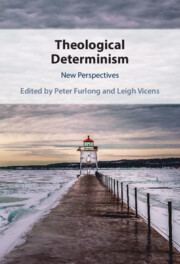Book contents
- Theological Determinism
- Theological Determinism
- Copyright page
- Contents
- Contributors
- Acknowledgments
- Introduction
- Chapter 1 Theological Determinism and Creation
- Chapter 2 Am I Here by Accident?
- Chapter 3 You Searched Me and Knew Me
- Chapter 4 Fatalism and Some Varieties of Contrastive Explanation
- Chapter 5 Divine Transcendence
- Chapter 6 The Incompatibility of Universal, Determinate Divine Action with Human Free Will
- Chapter 7 Natural Compatibilists Should Be Theological Compatibilists
- Chapter 8 An Argument for Theological Incompatibilism
- Chapter 9 Human Freedom and the Inevitability of Sin
- Chapter 10 Hard Theological Determinism and Divine Forgiveness Are Incompatible
- Chapter 11 Moral Luck, Free Will Theodicies, and Theological Determinism
- Chapter 12 Divine Determinism and Gratitude for Sins
- Chapter 13 The Problem of Trust
- Chapter 14 Toward a Reactive Attitudes Theodicy
- Chapter 15 Christ in Gethsemane
- Bibliography
- Index
Chapter 10 - Hard Theological Determinism and Divine Forgiveness Are Incompatible
Published online by Cambridge University Press: 30 September 2022
- Theological Determinism
- Theological Determinism
- Copyright page
- Contents
- Contributors
- Acknowledgments
- Introduction
- Chapter 1 Theological Determinism and Creation
- Chapter 2 Am I Here by Accident?
- Chapter 3 You Searched Me and Knew Me
- Chapter 4 Fatalism and Some Varieties of Contrastive Explanation
- Chapter 5 Divine Transcendence
- Chapter 6 The Incompatibility of Universal, Determinate Divine Action with Human Free Will
- Chapter 7 Natural Compatibilists Should Be Theological Compatibilists
- Chapter 8 An Argument for Theological Incompatibilism
- Chapter 9 Human Freedom and the Inevitability of Sin
- Chapter 10 Hard Theological Determinism and Divine Forgiveness Are Incompatible
- Chapter 11 Moral Luck, Free Will Theodicies, and Theological Determinism
- Chapter 12 Divine Determinism and Gratitude for Sins
- Chapter 13 The Problem of Trust
- Chapter 14 Toward a Reactive Attitudes Theodicy
- Chapter 15 Christ in Gethsemane
- Bibliography
- Index
Summary
In this chapter, I argue that hard theological determinism is strictly incompatible with divine forgiveness. After laying out my argument for this conclusion and defending its central premises, I discuss some implications of the argument. I focus in particular on the apparent conflict between hard theological determinism and traditional theological perspectives. My discussion of these issues also highlights a reason why religious believers might attach importance to the idea that we sometimes have free will and are morally responsible for at least some of our behavior.
- Type
- Chapter
- Information
- Theological DeterminismNew Perspectives, pp. 165 - 183Publisher: Cambridge University PressPrint publication year: 2022
- 1
- Cited by

